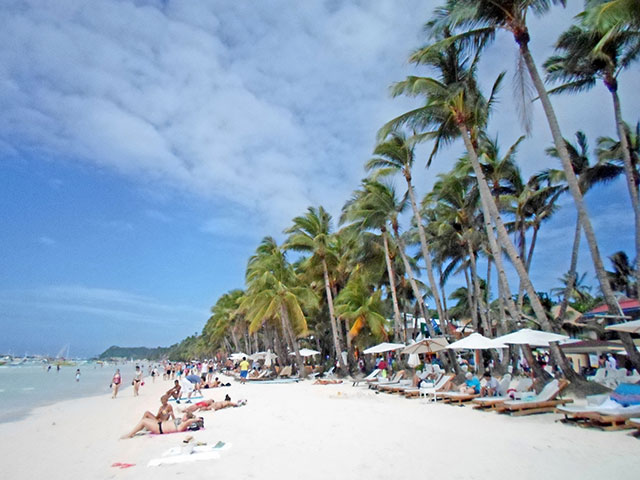
MANILA — Tourists are still welcome to visit Boracay during the Holy Week and throughout summer, as the proposal to temporarily close the island to fix environmental problems is expected to take effect afterward, or during the tourist spot’s lean season.
Presidential Spokesperson Harry Roque made this remark, following concerns that the island’s temporary closure would mean tourists would no longer get to enjoy one of the country’s top tourist destinations during its peak season.
“Proceed to Boracay, especially since it’s Holy Week. I don’t think any closure will happen during the peak season of Boracay. We’re looking at, possibly, if the President (Rodrigo R. Duterte) finally accepts the recommendation, lean season,” Roque said in a Palace briefing on Thursday.
To date, Roque said there is no specific instruction from the President on the planned closure.
Earlier, Duterte said he was supportive of the recommendation of Department of the Interior and Local Government (DILG) officer-in-charge Eduardo Año to close Boracay for six months.
“Right now it’s status quo,” Roque clarified. “There’s a recommendation, but the President will (still have to) act on it.”
The Palace spokesman said he still had to verify if the issue of Boracay would be discussed at the next Cabinet meeting set on April 3, after the Holy Week break.
He also bared that Boracay Tubi System, Inc. (BTSI), one of the two water service providers in Boracay Island, Aklan, would do the drainage of Boracay for free.
The offer, he said, comes from Macro-Asia, BTSI’s mother firm and one of the two water concessionaires in Boracay.
Moratorium
Roque reiterated that Duterte’s move to temporarily close Boracay has nothing to do with the reported construction of two new casinos on the island, but only to fix top tourist spot’s environmental woes.
He explained that a moratorium on building construction on Boracay, presented by the municipal government of Malay in Aklan, is expected to be implemented starting June.
“We’re fixing it, so it becomes a sustainable environment,” Roque said. “I don’t really know how the temporary closure will affect the casinos because they will have to construct. But what I do know is there’s a moratorium in place for any further improvements in Boracay.”
Roque added if the casinos are indeed constructed in Boracay, the Department of Environment and Natural Resources (DENR) is bound to require them to include zero-discharge facilities that allow the reuse of waste water.
“If they build a facility as big as they want to build, perhaps the DENR will require what Shangrila Boracay has, which is zero discharge. When we talk about zero discharge, that means they’re actually reusing all waste water, treating it and reusing it either for flushing or for gardening purposes,” Roque said.
Roque also stressed anew developers had been warned that their plans to develop infrastructure in Boracay would depend on Duterte’s decision to act on the proposed closure.
“Gaya ng sinabi ko po (As I said) the last time, caveat developer, warning to the developer, they should know that all their development plans hinges on what the President will decide upon on the issue of Boracay,” Roque said. “Right now, there’s a moratorium on new improvements, so they can’t build even if they wanted to today because of the moratorium.”
He pointed out that whether or not the plan to construct two casinos in Boracay pushes through, the government still has to put up more infrastructure for both drainage and sewage treatment facilities there.
“That’s the argument for closing Boracay because you can’t dig the roads, you can’t put waste water treatment under the road, you can’t expand the roads if you have tourists lurking around Boracay,” Roque said.